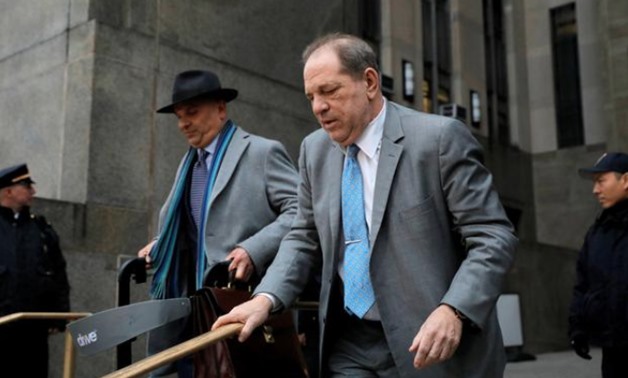
Film producer Harvey Weinstein exits New York Criminal Court during his sexual assault trial in the Manhattan borough of New York City, New York, U.S., February 18, 2020. REUTERS/Andrew Kelly
NEW YORK (Reuters) - The jury in former Hollywood producer Harvey Weinstein’s rape trial is expected to continue deliberations on Wednesday, a day after the presiding judge took the former Hollywood producer’s lead defense lawyer to task for writing an opinion piece about the case.
The Manhattan jury of seven men and five women began their discussions on Tuesday morning after receiving legal instructions from state Justice James Burke.
Weinstein has pleaded not guilty to sexually assaulting former production assistant Mimi Haleyi in 2006 and raping Jessica Mann, a onetime aspiring actress, in 2013.
Before jury deliberations began, Burke told Weinstein’s lead lawyer, Donna Rotunno, that she must not speak to the press until a verdict had been reached.
“I would caution you about the tentacles of your public relations juggernaut,” Burke told Rotunno.
The warning came two days after Rotunno wrote the opinion piece about the case in Newsweek magazine titled “Jurors in my client Harvey Weinstein’s case must look past the headlines.”
Rotunno told Burke that the article was not intended to address the jury directly.
Jurors sent two notes to the judge on Tuesday. The first, sent after less than an hour of deliberations, sought clarification of their legal instructions, which Burke provided.
In a second note, they requested exhibits, including a blueprint of the apartment where Weinstein allegedly assaulted Haleyi and a 2017 email he sent to a private investigator with a list of names highlighted as “red flags.”
The list included Annabella Sciorra, who testified that Weinstein entered her New York apartment one winter night in 1993 or 1994 and raped her. The accusation is too old to be charged as a separate crime, but it could act as an aggravating factor to support a predatory sexual assault charge, which carries a potential life sentence.
Prosecutors have said the email is evidence that Weinstein tried to prevent Sciorra and other accusers from going public with their accusations.
Since 2017, more than 80 women have accused Weinstein of sexual misconduct. Weinstein, whose films include “The English Patient” and “Shakespeare in Love,” has denied the allegations and said any sexual encounters were consensual.
The allegations fueled the #MeToo movement, in which women have accused powerful men in business, entertainment, news media and politics of sexual misconduct.

Comments
Leave a Comment